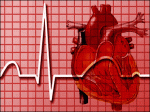 During National Heart Month, we are reminded that heart disease is the number one killer of women. Educate yourself and women in your community by ordering a Free Heart Health Kit. Check out other FDA resources including tips on using cholesterol and high blood pressure medicine safely, eating for a healthy heart and more. The Women's Health Research Institute has also focused their February e-newsletter on new information on atrial fibrillation in women. To view click HERE.
During National Heart Month, we are reminded that heart disease is the number one killer of women. Educate yourself and women in your community by ordering a Free Heart Health Kit. Check out other FDA resources including tips on using cholesterol and high blood pressure medicine safely, eating for a healthy heart and more. The Women's Health Research Institute has also focused their February e-newsletter on new information on atrial fibrillation in women. To view click HERE.
 Women were nine times more likely to develop takotsubo cardiomyopathy (TTC), or "broken heart syndrome," than men, and older women more likely than younger, researchers found.
Women were nine times more likely to develop takotsubo cardiomyopathy (TTC), or "broken heart syndrome," than men, and older women more likely than younger, researchers found.
In a database that included 6,178 women, those older than 55 were 4.6 times more likely to develop the condition than younger women, reported Abhishek Deshmukh, MD, a cardiology fellow at the University of Arkansas.
Although it's been known that women have a higher rate of TTC than men, those data come from small studies or single-center studies. Deshmukh's study was a significantly larger sample and it confirmed a sharp jump in women over 55 and older. He surmised that a hormonal component could be responsible since researchers did not see a difference in TTC rate in men related to age.
For the study, the investigators combed the Nationwide Inpatient Sample, the largest hospitalization database from the U.S. They calculated the overall frequency of TTC to be 5.2 per 100,000 women and 0.6 per 100,000 men.
Typically, patients with TTC present with symptoms of an MI. EKG and enzymes will be positive for an myocardial infarction (heart attack) , but there will be no coronary stenosis (blockage), Deshmukh said. Once MI is ruled out, clinicians can test for TTC. In TTC, the left ventricle at the apex will dilate. In Japanese, “tako-tsubo” means “fishing pot for trapping octopus,” and the left ventricle of a patient diagnosed with this condition resembles that shape. Treatment is consistent with that for congestive heart failure including beta blockers and ACE inhibitors.
It's difficult to predict who will develop TTC, which usually occurs after extreme stress such as the death of a spouse, but positive stresses -- such as winning the lottery -- can also trigger the condition.
However, researchers are examining characteristics of the left ventricle at the onset of TTC. Apparently, there are a number of ventricular variants involved in the disease. "The hope is that with the identification of these characteristics, we can predict who is at risk," Deshmukh said. He emphasized that recovery from TTC is uneventful and generally assured.
This study was presented at an American Heart Association meeting and the findings still need to be published in a peer reviewed journal.
 Study finds women who suffer from hot flashes when they begin menopause are at lower risk for cardiovascular events
Study finds women who suffer from hot flashes when they begin menopause are at lower risk for cardiovascular events
You are enjoying a night out with friends when it starts; first you feel flush, then a sensation of warmth crawls down your body. Soon you begin perspiring and you feel as if everyone around you can tell what is happening – another hot flash. An estimated three out of four women experience hot flashes associated with menopause and nearly all would agree they are a nuisance, but experts say there could be an upside to having hot flashes. New research released today in the online edition of the journal Menopause suggests that women who suffer from hot flashes and night sweats may be at lower risk for cardiovascular disease, stroke and death.
“While they are certainly bothersome, hot flashes may not be all bad,” said Emily Szmuilowicz, MD, endocrinologist at Northwestern Medicine and lead author of the study. “Our research found that despite previous reports suggesting that menopause symptoms were associated with increased levels of risk markers for heart disease, such as blood pressure and cholesterol, the actual outcomes tell a different story.”
Szmuilowicz, who co-chaired the study along with JoAnn Manson, MD and Ellen Seely, MD from Harvard Medical School, reviewed medical information from 60,000 women who were enrolled in the Women’s Health Initiative Observational Study and followed for ten years, to determine the relationship between menopause symptoms and cardiovascular events. Subjects were grouped into four categories – women who experienced hot flashes and night sweats at the onset of menopause, later in menopause, during both time periods, and not at all.
“We found that women who experienced symptoms when they began menopause had fewer cardiovascular events than those who experienced hot flashes late in menopause or not at all,” said Szmuilowicz. The results are significant since there has been concern that menopausal symptoms, which result from instability in the blood vessels in the skin, may put women at risk for other types of vascular problems as well.
“It is reassuring that these symptoms, which are experienced by so many women, do not seem to correlate with increased risk of cardiovascular disease,” said Szmuilowicz.
Szmuilowicz and team say more research needs to be done in order to understand the mechanisms behind the association, but say it’s good news for the millions of women who experience these troublesome symptoms at the time of menopause.
“Hot flashes will never be enjoyable, but perhaps these findings will make them more tolerable,” said Szmuilowicz.The paper titled “Vasomotor symptoms and cardiovascular events in postmenopausal women” is now available online and will be printed in the June issue of Menopause. For more information, visit .
Source: Northwestern Memorial Hospital, Chicago
